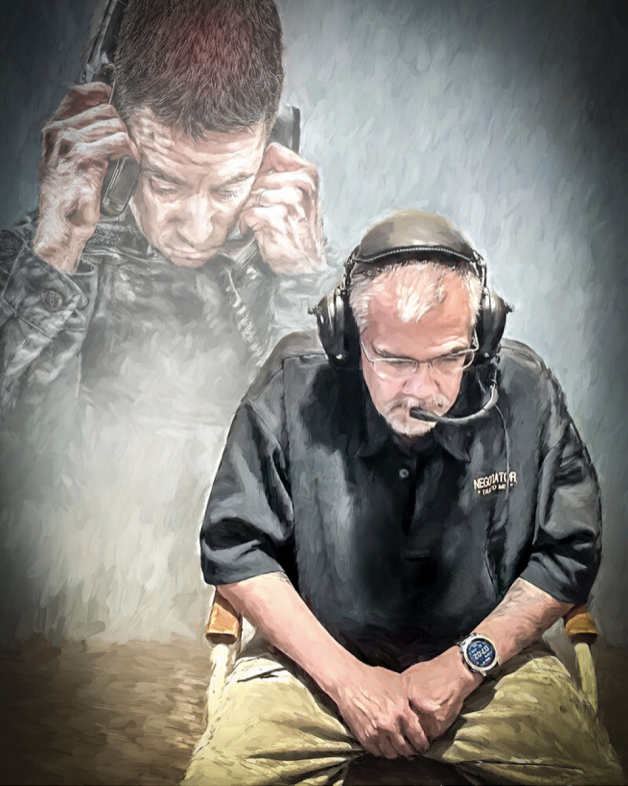Humiliation - Suicide
Humiliation:
The number one Feeling word used by suicidal people and by those who are prone to violent anger.
This story is about a SWAT hostage negotiator, Mark Lowther, who hears ‘humiliated’ as the number one word used by suicidal people or people about to become violent. Thanks to Mark sharing his experience, humiliated is the newest feelings addition to Listening Game Cards.
Mark Lowther is the negotiator in this picture. Thanks to him and a number of de-escalation-focused colleagues and trainers at Jumpstart Mastery, I’m learning how violence is predictable in some cases. Expressions of humiliation are often a big part of that predictability. I’m also learning how hard some hostage negotiators work to identify feelings and needs that connect with the person they are negotiating with. Mark uses cards.
The negotiator pose.
Give yourself a moment to look carefully at this work of art. No worries, no one was hurt.
Notice any feelings that might stir for you. This is just a noticing moment.
Noticing what arises inside you first, and then beginning to imagine what might be happening with the two people portrayed.
Consider what you see physically, literally, and logically. Both appear male and white though at least one could be mixed race. There’s probably a 20-year age difference, plus or minus. One has a watch, the other, a gun.
Consider what you imagine is going on. Can you guess what either is thinking, feeling, or needing? Are you so sure?
The man in the chair is Mark Lowther, a retired SWAT negotiator who now teaches de-escalation skills to officers around the globe. You’ve probably noticed Mark’s gear: a watch, noise-canceling headphones, and a mic. His posture is as intentional as his gear. He’s seated and looking down to help himself focus while working in what could be a very active scene around him. His watch helps him know how long he’s been working with the man in the shadow.
The man in the shadow is the artist’s rendition of a person that could be any number of people Mark told the artist about. The artist, Daniel Sundahl, is also a first responder. I’ve extracted this information from a LinkedIn Post by the artist. He said, “Mark and I spoke about some of his experiences, and he gave me a glimpse into the world of negotiators, and I can truly say that I had no idea of the stressors these men and women face.” The man in the shadow represents the trust and connection between the negotiator and the subject.
Trust and connection, honesty, authenticity, acknowledgment/validation, and respect/appreciation are core human needs that can underly feelings of humiliation.
Mark uses cards. And sometimes, Listening Game Cards. When working overseas, Mark sometimes uses similar cards, with fewer words, in other languages, including Russian with English translations. Cards can help prompt a negotiator's thoughts on what to ask next, maximizing opportunities to connect with a person in deep distress. After the event, cards can help the negotiator with their own feelings and needs debrief.
Mark blew me away when he literally showed his cards at the first Feelings and Needs Exploration session with Jumpstart Mastery. Imagine my delight in seeing someone in the audience who knows.
At our next meeting, Mark asked why the word ‘humiliated’ wasn’t in the Listening Game Cards set. I had no good answer. There were similar words in the set such as ashamed, embarrassed, and hopeless but I honestly hadn’t looked as deeply at the word humiliated as I had at so many others. Mark looked down, shook his head slightly, picked up a card, showed the Zoom camera the Feelings side of the card, and gently said, “It’s the number one word we hear from suicidal people and people who are about to be violent.” He went on to explain that the people hostage negotiators encounter see words like embarrassed or ashamed as wimpy. They want, no, they need to show how much they hurt inside. They need to feel heard, to matter.
Humiliated has been added to the Listening Game Cards with thanks and deep appreciation for Mark’s sharing.
What happens when someone is humiliated at work, at home, or in the community? What can you do? If you can make the time to listen compassionately, without judgment, then make that time to warmly accompany them. Listen to understand their experience and not for assessing, evaluating, judging or problem-solving – just listen to understand where they are emotionally. You don’t have to agree with any actions they or anyone else took. Just listen. Your compassionate listening can make a big difference. The power of full presence is immense.
But don’t try to force it. People in distress have a pretty good BS radar. They can tell when you are not sincere, are half-present, rushed, torn. They may even try to accommodate you, which doesn’t do much for the original intent of helping them!
What matters is that you are aware of the importance of the word, humiliated. Perhaps if you hear someone using the word, you can make a note to check in with them later when you can give them your full attention.

